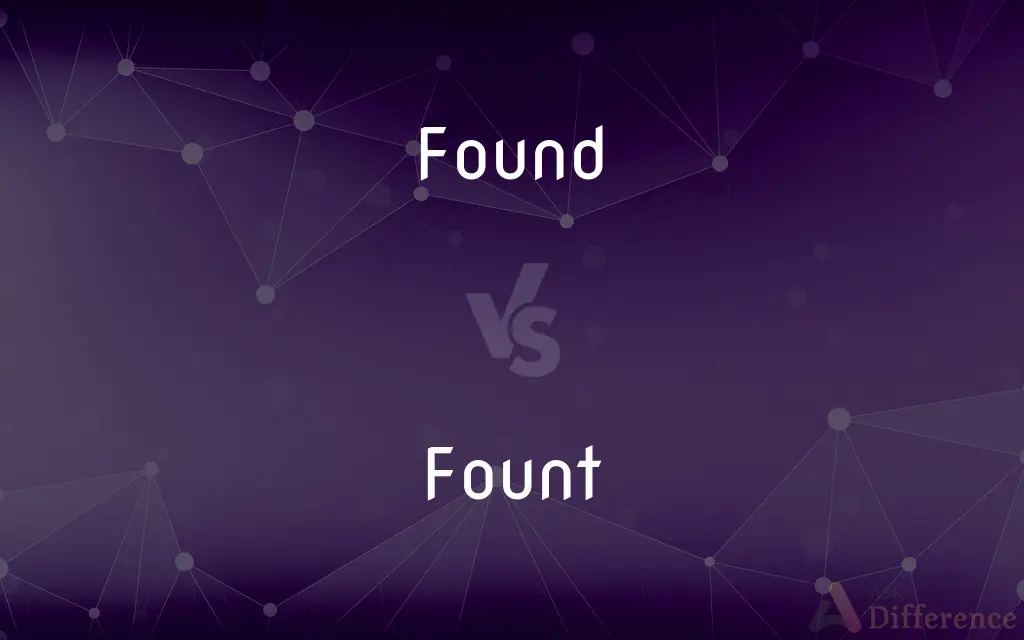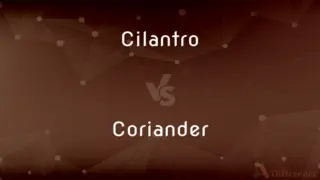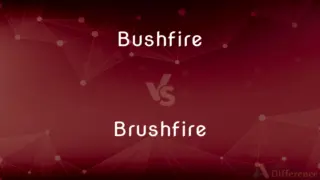Found vs. Fount — What's the Difference?
By Tayyaba Rehman & Fiza Rafique — Updated on April 24, 2024
Found primarily denotes establishing or discovering something, while fount refers to a source or origin, especially of something abstract.

Difference Between Found and Fount
Table of Contents
ADVERTISEMENT
Key Differences
Found is a verb commonly used to mean establish or set up, as in founding a company. Whereas fount, though less common, serves as a noun, denoting a source or origin of a desirable quality or commodity.
In everyday language, "found" is frequently used in contexts like historical discoveries or the creation of institutions, underscoring the act of creation or discovery. On the other hand, "fount" is poetic and often used metaphorically, such as in the phrase "fount of knowledge," implying a plentiful source.
The use of "found" extends into legal and business terminology, implying the initiation of enterprises or legal entities. In contrast, "fount" maintains a literary or figurative use, rarely seen in formal or technical discourse.
Found can also function as the past tense and past participle of the verb "find," which means to discover something by searching or by chance. Whereas fount never changes form, as it is strictly a noun.
In terms of phonetic and spelling differences, "found" is one syllable with a 'd' at the end, making it sound final and conclusive. Fount, however, ends in 't' and tends to linger slightly on pronunciation, giving it a more flowing and less definitive sound.
ADVERTISEMENT
Comparison Chart
Part of Speech
Verb (also used as past tense of "find")
Noun
Common Usage
Establishing, discovering something
Source or origin, especially abstract
Example Usage
Founding a company, found lost keys
Fount of knowledge, fount of inspiration
Phonetic Ending
Ends with a hard "d"
Ends with a softer "t"
Usage in Sentences
Formal, legal, business contexts
Poetic, literary contexts
Compare with Definitions
Found
To establish something new.
He found a new startup in the tech industry.
Fount
Source of a continuous supply.
He is considered a fount of wisdom among his peers.
Found
To have discovered something.
She found her lost earrings under the bed.
Fount
Figuratively, a source of knowledge.
The library was a fount of knowledge.
Found
To create or initiate.
The committee was found to investigate the issue.
Fount
Origin of something valuable or desirable.
This book is a fount of inspiration for young artists.
Found
To determine or deem something formally.
The court found the defendant guilty.
Fount
A principal source of something.
The river is the fount of the village's water supply.
Found
To lay the base of something.
They found the new school on principles of equality and respect.
Fount
Literally, a fountain or spring.
They gathered around the ancient fount.
Found
Past and past participle of find
Fount
A source of a desirable quality or commodity
Our courier was a fount of knowledge
Found
Establish or originate (an institution or organization)
The monastery was founded in 1665
Fount
A spring or fountain.
Found
Base (something) on a particular principle, idea, or feeling
A society founded on the highest principles of religion and education
Fount
Variant spelling of font
Found
Melt and mould (metal).
Fount
A fountain.
Found
Having been discovered by chance or unexpectedly.
Fount
One that initiates or dispenses; a source
Damascus—the fount of modern Arab nationalism.
Found
(of a ship) equipped
The ship was well found and seaworthy
Fount
Variant of font2.
Found
To establish or set up, especially with provision for continuing existence
The college was founded in 1872.
Fount
Something from which water flows.
Found
To establish the foundation or basis of; base
Found a theory on firm evidence.
Fount
A device from which poultry may drink.
Found
To melt (metal) and pour into a mold.
Fount
(figuratively) That from which something flows or proceeds; a source.
He is a real fount of knowledge!
Found
To make (objects) by pouring molten material into a mold.
Fount
A typographic font.
Found
Past tense and past participle of find.
Fount
A font.
Found
Simple past tense and past participle of find
Fount
A fountain.
Found
(transitive) To start (an institution or organization).
Fount
A specific size and style of type within a type family
Found
(transitive) To begin building. en
Fount
A plumbing fixture that provides a flow of water
Found
To melt, especially of metal in an industrial setting.
Found
To form by melting a metal and pouring it into a mould; to cast.
Found
(obsolete) Food and lodging; board.
Found
A thin, single-cut file for comb-makers.
Found
To form by melting a metal, and pouring it into a mold; to cast.
Found
To lay the basis of; to set, or place, as on something solid, for support; to ground; to establish upon a basis, literal or figurative; to fix firmly.
I had else been perfect,Whole as the marble, founded as the rock.
A man that all his timeHath founded his good fortunes on your love.
It fell not, for it was founded on a rock.
Found
To take the ffirst steps or measures in erecting or building up; to furnish the materials for beginning; to begin to raise; to originate; as, to found a college; to found a family.
There they shall foundTheir government, and their great senate choose.
Found
A thin, single-cut file for combmakers.
Found
Food and lodging provided in addition to money;
They worked for $30 and found
Found
Set up or found;
She set up a literacy program
Found
Set up or lay the groundwork for;
Establish a new department
Found
Use as a basis for; found on;
Base a claim on some observation
Found
Come upon unexpectedly or after searching;
Found art
The lost-and-found department
Common Curiosities
Can "found" and "fount" be used interchangeably?
No, "found" and "fount" cannot be used interchangeably as they have distinct meanings and usages.
How is "fount" most commonly used?
"Fount" is commonly used to denote a source or origin, often of abstract qualities like knowledge or inspiration.
What is a poetic way to use "fount"?
Referring to someone or something as a "fount of wisdom" is a poetic usage.
Is "found" used in legal contexts?
Yes, "found" is used in legal contexts to refer to the establishment of entities or findings in court.
How is "fount" pronounced?
"Fount" is pronounced /faʊnt/, with a soft 't' at the end.
What are some examples of institutions that can be "found"?
Examples include universities, companies, or charities.
Is "fount" used in modern language?
"Fount" is less commonly used in everyday speech and is more typical in literary or poetic contexts.
What does "found" typically signify in usage?
"Found" generally signifies establishing or creating something new, or discovering something.
What are some synonyms for "fount"?
Synonyms include source, spring, and origin.
How can "found" be used to describe a discovery?
"Found" can describe discovering something lost or previously unknown, like finding hidden treasures.
What is a literal example of a "fount"?
A literal example is a fountain or a natural spring.
How does the past tense use of "found" differ from its primary meaning?
The past tense use of "found" (from "find") refers to discovering something, whereas its primary meaning involves establishment.
What does "found" mean in historical contexts?
In historical contexts, "found" often refers to the establishment of cities, countries, or organizations.
What role does "found" play in business terminology?
In business, "found" refers to the act of starting a company or organization.
What are the grammatical forms of "fount"?
"Fount" remains constant as a noun and does not change grammatical forms.
Share Your Discovery

Previous Comparison
Cilantro vs. Coriander
Next Comparison
Bushfire vs. BrushfireAuthor Spotlight
Written by
Tayyaba RehmanTayyaba Rehman is a distinguished writer, currently serving as a primary contributor to askdifference.com. As a researcher in semantics and etymology, Tayyaba's passion for the complexity of languages and their distinctions has found a perfect home on the platform. Tayyaba delves into the intricacies of language, distinguishing between commonly confused words and phrases, thereby providing clarity for readers worldwide.
Co-written by
Fiza RafiqueFiza Rafique is a skilled content writer at AskDifference.com, where she meticulously refines and enhances written pieces. Drawing from her vast editorial expertise, Fiza ensures clarity, accuracy, and precision in every article. Passionate about language, she continually seeks to elevate the quality of content for readers worldwide.















































